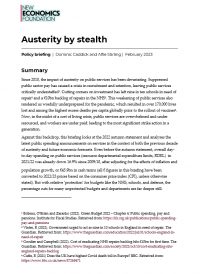Publications Austerity by stealth The effects of inflation on public spending By Alfie Stirling, Dominic Caddick 27 February 2023 Download the report Since 2010, the impact of austerity on public services has been devastating. Suppressed public sector pay has caused a crisis in recruitment and retention, leaving public services critically understaffed. Cutting corners on investment has left nine in ten schools in need of repair and a £10bn backlog of repairs in
Topics:
New Economics Foundation considers the following as important:
This could be interesting, too:
Robert Vienneau writes Austrian Capital Theory And Triple-Switching In The Corn-Tractor Model
Mike Norman writes The Accursed Tariffs — NeilW
Mike Norman writes IRS has agreed to share migrants’ tax information with ICE
Mike Norman writes Trump’s “Liberation Day”: Another PR Gag, or Global Reorientation Turning Point? — Simplicius
Austerity by stealth
The effects of inflation on public spending
27 February 2023
Since 2010, the impact of austerity on public services has been devastating. Suppressed public sector pay has caused a crisis in recruitment and retention, leaving public services critically understaffed. Cutting corners on investment has left nine in ten schools in need of repair and a £10bn backlog of repairs in the NHS. This weakening of public services also rendered us woefully underprepared for the pandemic, which resulted in over 170,000 lives lost and among the highest excess deaths per capita globally prior to the rollout of vaccines. Now, in the midst of a cost of living crisis, public services are overwhelmed and under resourced, and workers are under paid: leading to the most significant strike action in a generation.
Against this backdrop, this briefing looks at the 2022 autumn statement and analyses the latest public spending announcements on services in the context of both the previous decade of austerity and future economic forecasts. Even before the autumn statement, overall day-to-day spending on public services (resource departmental expenditure limits, RDEL) in 2021/22 was already down 16.9% since 2009/10, after adjusting for the effects of inflation and population growth, or £45.9bn in cash terms (all £ figures in this briefing have been converted to 2022/23 prices based on the consumer price index (CPI), unless otherwise stated). But with relative ‘protection’ for budgets like the NHS, schools, and defence, the percentage cuts for many unprotected budgets and departments are far deeper still.
Coming out of the latest autumn statement, the plans going forward told an almost paradoxical story of two halves. Over the next couple of years budgets are set to be squeezed in real terms as inflation bites into existing departmental settlements, with real terms spending per capita falling from 11.1% below 2009/10 levels in 2022/23 to 12.4% in 2024/25. Then, from 2025/26, a new round of austerity was pencilled in, with cuts rising to £20.1bn a year by 2027/28. But curiously, and despite the new cuts, real spending per capita would stop falling and instead rise to just 8.7% below 2009/10 levels by 2027/28.
This briefing takes a closer look at the assumptions and forecasts from the autumn statement. It shows that the true effect of austerity to come is likely understated by implausibly low forecasts for inflation, that see CPI move significantly below the Bank of England’s target, and even turning negative. New analysis for this paper shows that, if it is instead assumed that the Bank does its job, and inflation rests at 2% from the middle of the decade onwards, then this would imply real terms cuts – not growth – to spending of 2.0% between 2022/23 and 2027/28. In this more plausible scenario for inflation, real spending on public services in 2027/28 would be £28.0bn lower than the government’s current projection, £8.9bn below spending today, and £24.9bn below 2009/10 levels.
Topics Macroeconomics Public services




